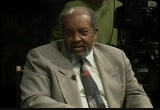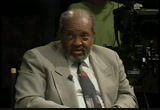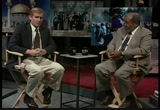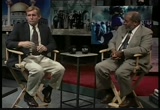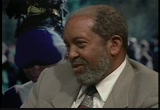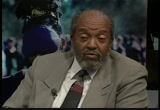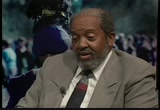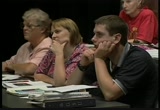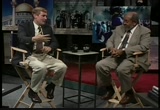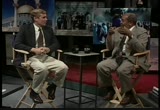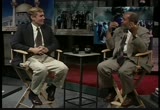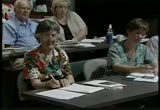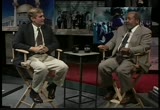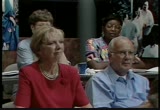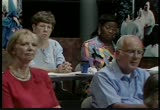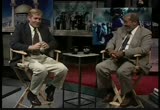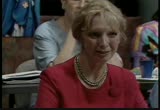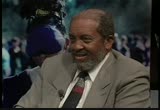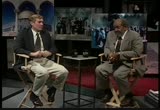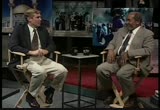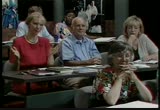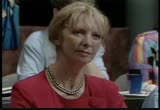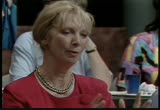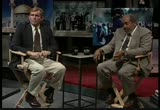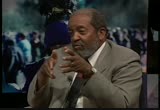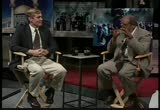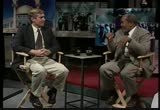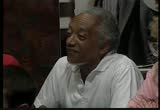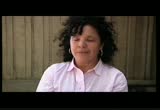tv Mosaic World News LINKTV November 1, 2012 7:30pm-8:00pm PDT
7:30 pm
was mentioned that some of the slaves were told- to get them to feel at ease- they were told that where they were being taken, the streets were paved with gold. yes, i heard that that happened. well, farad did that. i guess he read that and he told us that in mecca, the streets were paved with gold. he said, "there are mansions there, built for you already, and they're waiting for you." and when i went there, i saw rocks and sand. you know, that was before aramco pulled out, you know, and turned over everything to the saudis, the kingdom of saudi arabia. so i saw rocks and sand- i didn't see any streets paved with gold; there was no golden fountains in the hotels or anything. now there are, but- >> yeah, i'll say. fire away, janet. >> is that part of what helped change your mind and increase your understanding was the fact that you saw rocks and sand instead of the- >> no. my father was disappointed. i expected- by that time, i was old enough and really informed of what the world looked
7:31 pm
like enough to not to be disappointed. my father was disappointed. before he went to saudi arabia- and he made umrah, the lesser pilgrimage. he made umrah, where you go by yourself, not with all the muslims- the annual pilgrimage. and he made the lesser pilgrimage to mecca, he went to pakistan, he went to egypt. and most disappointing for him was what he saw in saudi arabia. he expected a beautiful place, you know, the best place on earth, and when he got there, it was just the opposite. as far as physical conditions, it might have been almost the worst place on earth, you know. and he came back and he stopped, he changed his emphasis from religion to business, in economics- that's how disappointed he was. and he told us that we can't look to go there; he said we have to find our life right here in america. he said that everything we need, we can have it right here in america. so he changed his
7:32 pm
direction for us, he changed his vision for the future. >> you know, i wanted to run this by you. i don't know if you had a chance- the way i've spoken about it, and we had some notes here, is when we speak about religion, we talk about two very fundamental things, and one is identity- you know, who you are- and one is your relationship with god or with other people. and to try to make sense of elijah muhammad's teaching of nation of islam, i've talked about it in terms of identity being self-esteem and relationship as being empowerment, and that's what african-americans needed because of being marginalized, being pushed aside. does that make any sense? >> well, it comes home very clearly to me. >> yeah. i'm saved! >> yeah, that's what it was all about. it was all about getting us to feel better about ourselves, putting more value on ourselves as human beings in the human
7:33 pm
family, and finding new relationships with the blacks as muslims. now, in this new idea, what islam is, or what a muslim is, you know, and that made us feel powerful. and the more numbers we got, the more powerful we felt, and after a while, we felt too powerful- we felt more powerful than we really were, and we were doing things that caused trouble in the society of america. >> oh, fire away, virginia. >> my question will be about the children. do you find that taking the children young and giving them your faith that they in turn will be good examples as they grow and in turn help you convince other people? i mean, to me, that's such a resource, to be able to have faithful children to your belief. >> yes, i do. yes, i do. i believe- i'm a sincere believer in god and in religion.
7:34 pm
if they not just teach, invite the children to be like them, but if they live the life of their religion with their children, before their children, and share knowledge with them, but the most important thing is that they live the life of a believer, i think that that helps the child to survive the troubles that we are going to face in this world. >> good question. chris, fire away, and then susanna. >> as an african-american in today's society, what is the refocusing of your goal, the social goal of you, and how does that differ from the nation of islam, or are they together, and could you speak a little bit about that? >> yes. well, i agree with dr. salam, that they are now different worlds. i don't believe that we- i know
7:35 pm
the old structure of racism is gone, but there are still individuals who live- think the way they think and live the way they live, and have their opinions. and we still get together with each other, and we live differently, and we are different, and that's what many of us perhaps don't want to admit- we are different. we're humanly the same in human identity, but when it comes to our sensitivities, our emotions, etc., we have the sensitivities and the emotions and the mentality and thinking of our people more than any other people, and that's for every people- for every people. so we are different, and we do kind of live in different worlds. and as far as the perception of reality, i think
7:36 pm
african-americans and most people in modern civilization have a long ways to go before they perceive reality in the right way that will permit them to have the kind of brotherhood that we all hope for in these great religions of christianity, judaism, islam, etc. before we can have that real brotherhood, that feeling of love for my fellow human being, i think we have to grow up and mature a lot when it comes to perceiving the realities that we think we know already, you know. i'm talking about our nation. the way i perceive our nation, i think, is very healthy for me, and i wish all african-americans could perceive this america the way i perceive it, but they don't. and the many white americans that i have become acquainted with perceive this nation as not the way that i think would give me a good life and my children a good life if i passed those feelings on to my children.
7:37 pm
so american people, in my opinion- and not only the way we perceive america, the way we look at human beings, too, human life and everything, i think we are a society of people that are far advanced when it comes to science and technology, and even the ability to socialize with each other- we are more socially mature than most people that i meet outside of america. but i think we are far behind our advancement in technoscience and technology when it comes to social maturity- perceiving what society should be, what a human being is. i think we have exaggerations, some of us, of what a human being is and what we should expect of a human being- exaggerations- and some of us poorly estimate the value of human beings. so we are not- to me, we are not the greatest society when it comes to social maturity. >> you know, that's one of the
7:38 pm
problems we've wrestled with in this class over and over again, because we hear such beautiful statements of love and caring and equality and justice coming from deeply religious people, and it's like you say, you know, somehow we haven't matured to a level that even respects the religions we profess. i'm just curious, in terms of your understanding of islam, how does that, in your own life, lend itself to making us better- better human beings? >> well, i don't want to compare my religion with another religion, you know. >> i guess more personally, then. >> yeah. well, from my personal- i'll speak from personal experience. from personal experience, i find that i have to really depend mostly upon my ability to think and make accurate decisions or
7:39 pm
sound judgments, etc. i find that for my own life, for my own peace of mind, i have to depend upon my mental abilities more than my heart or my emotional nature, my love for things. and i think the american people- not just black people- but american people tend to have this big, this great love for everything, you know, and a great love for people and a great love for god. and sometimes this love for god, to me, is kind of, i would say, alcoholic- >> addiction. >> alcoholic, yeah. yeah, it's got too much alcohol in it, you know. >> we've heard that before, yeah. >> yeah. so this seems to be the problem. and i think we who have come to a new idea of islam, what the nation of islam did for us is
7:40 pm
those who survived, it made us want to understand a thing before we accept it. so i didn't get islam from saudi arabia- i had plenty pakistani friends; i got one here, i think muhude is taking pictures, and he's the camera- the graphics man and camera man for our journal, the muslim journal. and those people, they know the world of islam, they know the tradition. and i love to listen to them talk and everything, but i'm trying to digest everything with my own mind, with my own good senses, you know, i'm trying to digest everything. so i've come to my perception of islam, and the course of the nation of islam- making me curious, making me skeptical, etc., you know. so i think in a way, god helped us in a strange way, and god does that sometimes- in a strange way, we've been helped. so i don't buy the religion that somebody's offering me from egypt or saudi arabia and everything, you see?
7:41 pm
and because of that now, i'm looking at my obligations to god very much like dr. salam sees it- that i'm obligated to live a full life. and i can't dismiss science or history- i have to appreciate history, i have to appreciate science, and have to find the truth in all of these things. and that's the way i feel about it, and i feel that we need to do more thinking when it comes to trying to live as families and trying to have community life, neighborhood life. we need to do more thinking and have less emotions involved, and do more thinking, and more planning for our future, with a new perception of the human being that we have in our religion islam. god gives us a perception of the human being, and the human being is focused, in our religion, firstly as an intellect-
7:42 pm
as an intellect. god says he made adam, and he taught adam the names of everything, and then he said to adam, he said, "tell the angels their names." he said, first he asked the angels to- "tell me your names." and they said, "we know nothing except what you've given us, god." and he said, "adam, tell them their names," and adam told them their names. so this is how the story of adam begins with us. >> with the intellect. >> intellect, with the intellect. and later, he becomes the father of the social families. >> good point. you see that, the social family? do you see how the doctrine plays out on the ethical plain and then comes back and impacts on the society- how we behave? >> certainly. certainly. and as we develop our minds with the right perception of our identity as intellect and social creatures in the family of mankind, i think we can be successful in restoring the family, black families that have fallen, and black neighborhoods, especially that's in bad repair-
7:43 pm
we can do a lot of good. but we have to first see clearly, perceive correctly, and we can't do it with a lot of emotions. >> real good point, because in all these turmoils, it's emotions that often get in the way. anita, and then let me get jamie. oh, i forgot you susanna. go ahead, anita. >> the pilgrimage to mecca, is it required of the religion, or does the qur'an state that it's necessary, a command of allah? >> i'm not hearing you very clearly, and it's because my daughter says, "daddy, you need a hearing aid." >> i can help. >> well, thank you. >> the pilgrimage to mecca, is it required by the religion, islam as a religion, or the nation of islam as a religion, or does the qur'an state that it's the command, or a command of allah for this pilgrimage to take place? >> yes. the pilgrimage to mecca is the fifth pillar of islam,
7:44 pm
or the fifth essential principle of islam. it's been interpreted by scholars, and i think most of the learned people in islam will agree with this meaning. it's the pillar of- it's the fifth pillar, and it's the pillar of the unity of humanity, the unity of mankind- the unity of mankind. and god orders us to make pilgrimage once in our lifetime if we have the ability, the health and the ability or the means, the financial means also- we are obligated to do that. the nation of islam has not required their members to do that as of yet, i don't think. but i think the nation of islam under minister farrakhan- i must say now that i think the nation of islam, in terms of coming closer to the real world, coming out of myth, into the real world- the nation of islam under farrakhan has made progress. and also, there's progress for,
7:45 pm
i think, their meeting with real islam. >> okay. so you're seeing some- the disparate or the separation is getting closer, then? >> yes, i think so. i think so. in fact, i think they're going to have to go through the same experience that i and those who came with me went through. yeah, they're just going to have- they're going to take more time doing it. >> yeah. it's that doctrinal wrestle, yeah. susanna, i'll let you jump in. >> and there will still be some believing in the old way, now- they're not going away. but their numbers will decrease and decrease as time marches on. >> you know, i love what you said about- you know, people have to make their own decision. i don't know if you heard that anecdote i opened with, but the young woman in my intro class who objected to a traditional islamic prayer- in fact, it was dr. assi up at the american islamic college-
7:46 pm
well, i think she was just thinking with her own mind. i mean, she saw islam in the way that she saw it and it was farrakhan and she was going to tell that whole class, you know, there it was. >> but i believe in that- let everybody be free to find their way, you know? >> yes. she taught me a lesson. susanna, go ahead. >> and it does, and it sounds like probably all the other great religions, including christianity and even catholicism, where you think, you have a stereotype of who that is for islam, too, but there's a wide diversity within each of these families. but i still believe we're all a lot more alike than we are different. >> that's true. that's my line. yes. >> right. and what i'm trying to piece together, too, is here was islam, and then came elijah muhammad and the man before him, and that became more of a black islam? was that the same as- >> no, that wasn't the first time though. there's a man- drew ali- noble,
7:47 pm
they call him noble drew ali- he started the north american movement. they identified as muslims. they identified also as moors- descendants of moors, from the moors. that's why- that explains the name moorish america. and they had, too, a lot of symbolism and myth rather than the real islam. so he came maybe eight or ten years earlier than farad, this man named farad, wallace d. farad. >> and then there was the movement toward the black ideology, which was- >> yeah, but the nation of islam, you're correct. it was the nation of islam that really came out openly and made religion black, made it the black man's religion and not the white man's religion- made god black and the religion black. but there was hints of this from
7:48 pm
a christian- in detroit also- a very big christian minister. oh, what's his name? he said he was god- the man who said he was god, and his white- >> father divine? >> father divine. thank you. thank you. thank you. i'm sorry i couldn't get that right away. father divine, he taught his people that god was a black man. and he was before farad, he was teaching before farad. i think farad- oh, i didn't finish my explanation on- much earlier, you lost patience and the time was running out; i could understand it, i didn't try to finish it. but now, if you don't mind, i'll finish it. >> oh, please. >> yeah. what i was wanting to say about farad is that his idea was really a scheme- a scheme, a plot, a trick- to get us to believe that we were getting a legitimate religion, and to hold
7:49 pm
us with that until we become more literate and understand reality better, more intellectually curious, and that we would see the ridiculousness- he intentionally made his religion very ridiculousness- that we would see the ridiculousness, and we would say, "oh, this can't be. but why would this man do this?" and the smarter ones would say, "oh, this was a scheme to get us out of that condition, into a new situation where we could make our own decisions- at least take us from there, and free us from that condition, and put us in a situation where we could make our own decision." that's what his plot was. i believe the man was very sincere, very innocent, and i think he thought that america deserved what he was doing to us. of course, at that time, we had jim crow south, you know- we still had a jim crow south at that time. yeah. >> you see, that's what i mean by empowerment- he had to empower the african-americans so that they could then make the decisions. i understand that.
7:50 pm
>> this other step that you are taking, where you differ from your father and the others, is this then- it doesn't seem to me, from what i'm hearing, that this is actually a swing back, if you wanted to call it that, toward original islam doctrine and so forth, as it is a moving forward into maybe another arena. am i on track with that, or- >> well, yes. to me, the change is a moving forward into real islam, but it is also a moving forward into the world of reality. and i don't think the qur'an, or the religion given to us as given by- as it is preached by muslims of the world could have brought about this change in me, or in many of those like me- i don't think it could have done it. it took what that man did, it took his trick to break the
7:51 pm
grip of what we thought the world was, what we thought white people were, what we thought the church was, to break the grip of that on us, and free us so we could make independent decisions. i think that's what opened the future for us, more than anything else. and believe me, it's the beautiful ideas in this country's, i would say, faith in democracy, in freedom, in god- in god too- the beautiful idea of american society also has impressed me. and the more i studied my religion and studied the history of america- founding father, civics, etc., the political ideas and how this country was developed- the more i studied that, the more i saw that the religion and the ideas of our founding fathers is very compatible- very compatible.
7:52 pm
yeah. so the more i saw that, the more it freed me to embrace the american idea. so no preaching from our side could have done that for me. >> i just have one more aspect that's rattling around here, and that is- i'm following what you're saying all along here- that i'm hearkening back to the last class. the first roll-in that we had, they spoke of how the men went to the synagogue and the women prayed at home. and the one we saw today, i'll get to them- oh, dear. yes, to the mosque, and i apologize- when they went to the mosque and the women stayed at home. and what we saw today was the women were at the mosque too. now they were separated- the men were apparently over here and the women were someplace else- but they were all at the mosque. in line with what many faith houses are doing now- and i guess i was being at the
7:53 pm
synagogue because i was getting ahead of myself. i went to a seder, an open seder this past december, and the rabbi made the statement after we should take the prayer books- the haggadahs- with us, because they were getting new ones, and they were going to not only just mention the patriarchs at this point, every time the patriarchs are mentioned, the matriarchs were also going to be mentioned. so that's sort of a roundabout way to ask, in islam, is there some such movement? are women coming into parity with men in this faith home? and in your particular, you know, kind of islam, is this true? is this happening also? >> yes. well, again, we look at the real worth of a human person with the intellect and focus and the moral life- the intellect and the moral life is the most important focus for us. and in terms of the moral life
7:54 pm
and intellect, according to our religion, male and female are one creation- one creation. that's why prophet muhammad insisted that the women be free to be educated, and he gave an incentive- he said if any father would see that two of his daughters are educated, god will give him a paradise. this is in the most popular records of what he did, what prophet muhammad said and did, the records of buhali and muslim- buhali and muslim, e havis- the sayings of the prophet buhali and muslim. and those volumes, you'll find that, where the prophet said that. and this is religion, so i can talk to you a little differently than i talk to the public, and in our holy book, the qur'an, as you know, the qur'an, god says he made you from one single nefs,
7:55 pm
and this nefs does not necessarily mean male or female- nefs does t have to mean male or female. soe made you from one single nefs, and they translate nefs in the arabic dictionaries or whatever meaning person, self, soul- soul- personality, taking all- the whole person, seen as the personality of that person. so this is the nefs- the soul- it comes from the soul; originally, it meant soul. so he made male and female from one soul- from one soul. and it says that- yes- and in the same book, he says, "the believing"- given the distinction between the two- "and the believing men and the believing women"- then it says, "- and the thinking men and the thinking women"- puts them side by side, that women are believers like men, and women
7:56 pm
are thinkersike men. so it's very clear to me, in our holy book, that god created the intellect- one- for male and female, created the soul, the human soul- one- for male and female, the intellect- one- for male and female. the difference is in physiology, and again, the qur'an makes that plain. it says, "and the men are responsible for women, because of their superior physique and their massive wealth." it didn't say because of intellect or because of some special soul, because they're both the same- humanly, they're the same. >> folks, we've got about one minute, believe it or not. >> and they didn't teach me that from overseas. >> thinking for yourself is the main lesson in this class, i'm telling you. jamie, let me let you- you've had your finger up here the whole time. we've got about a minute, unfortunately. >> u.s. news and world report for july 20th lists you as the
7:57 pm
most influential muslim leader- black, white, or asian. with that kind of leadership, do you expect louis farrakhan to begin to modify his stance, and if so, in what specific areas? >> well, let me say first that most of farrakhan's people and those that he attracts, they don't believe what the u.s. news and world report says. [laughter] >> hey, take it if you get it, right? >> but i do know that minister farrakhan- now i'll share this with you too. we used to be very good friends- i used to go to his home and he used to play violin; we used to laugh and joke and talk. i enjoyed his family, he enjoyed my family. so when we separated, we lost something, we missed something, and we still miss something- we miss this personal friendship we used to have. so he is really watching every step i make, and believe me, i am influencing what he's doing- in a good way, in a positive way.
7:58 pm
198 Views
Uploaded by TV Archive on

 Live Music Archive
Live Music Archive Librivox Free Audio
Librivox Free Audio Metropolitan Museum
Metropolitan Museum Cleveland Museum of Art
Cleveland Museum of Art Internet Arcade
Internet Arcade Console Living Room
Console Living Room Books to Borrow
Books to Borrow Open Library
Open Library TV News
TV News Understanding 9/11
Understanding 9/11